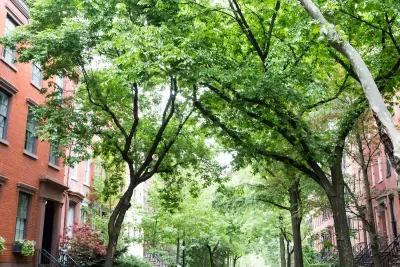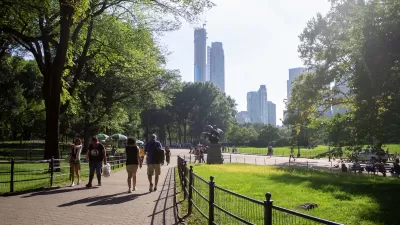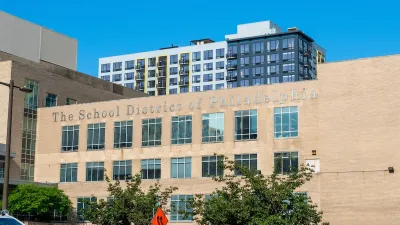More evidence that access to green spaces and walkable communities improve public health outcomes.

New research from the University of Maryland reveals that access to neighborhood green spaces and walkability contribute to different health outcomes for residents, according to an article by Annie Krakower in Maryland Today.
The study analyzed walkability and aesthetic data alongside health information to understand how the built environment impacts health among siblings and twins. “After examining records from nearly 2 million people, including 1 million siblings and 14,000 identical and fraternal twins, the team found that across all three samples, positive built environment characteristics were associated with 15-20% reductions in obesity and diabetes rates.”
The results show that green streets, sidewalks, crosswalks, and mixed-use development encourage more physical activity. “Future studies could also shine a light on how factors like income inequality and unequal access to desirable neighborhoods—along with modifiable built environment features— impact health.” Next, the researchers plan to examine data from Washington, D.C. to assess the impacts of other factors like gentrification and segregation on neighborhood population health.
FULL STORY: Walkability in Neighborhoods Linked to Health, Study of Siblings Shows

Planetizen Federal Action Tracker
A weekly monitor of how Trump’s orders and actions are impacting planners and planning in America.

San Francisco's School District Spent $105M To Build Affordable Housing for Teachers — And That's Just the Beginning
SFUSD joins a growing list of school districts using their land holdings to address housing affordability challenges faced by their own employees.

The Tiny, Adorable $7,000 Car Turning Japan Onto EVs
The single seat Mibot charges from a regular plug as quickly as an iPad, and is about half the price of an average EV.

Vehicle-related Deaths Drop 29% in Richmond, VA
The seventh year of the city's Vision Zero strategy also cut the number of people killed in alcohol-related crashes by half.

Seattle's Plan for Adopting Driverless Cars
Equity, safety, accessibility and affordability are front of mind as the city prepares for robotaxis and other autonomous vehicles.

As Trump Phases Out FEMA, Is It Time to Flee the Floodplains?
With less federal funding available for disaster relief efforts, the need to relocate at-risk communities is more urgent than ever.
Urban Design for Planners 1: Software Tools
This six-course series explores essential urban design concepts using open source software and equips planners with the tools they need to participate fully in the urban design process.
Planning for Universal Design
Learn the tools for implementing Universal Design in planning regulations.
Smith Gee Studio
City of Charlotte
City of Camden Redevelopment Agency
City of Astoria
Transportation Research & Education Center (TREC) at Portland State University
US High Speed Rail Association
City of Camden Redevelopment Agency
Municipality of Princeton (NJ)





























